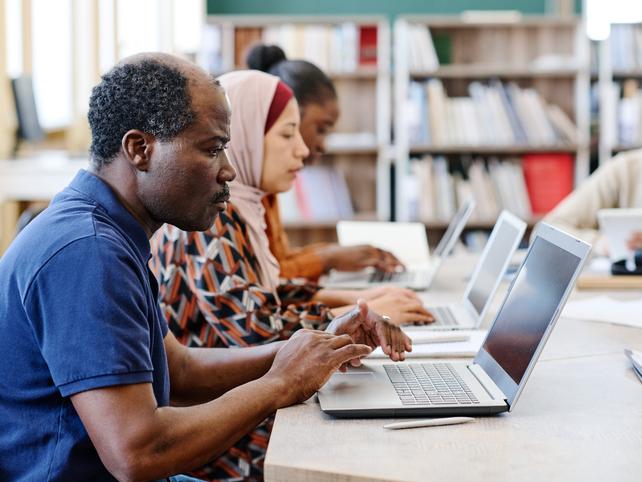
How higher education can lead the way in refugee resettlement

You may also like
The global refugee crisis continues to grow, with millions of displaced people seeking safety, stability and the opportunity to rebuild their lives. While government and humanitarian organisations play critical roles in resettling refugees in the United States, universities are ideally positioned to become support hubs. With new initiatives such as Welcome Corps on Campus, the federal government (with the help of six nationwide non-governmental organisations) is tapping into that power. It’s an exciting step.
Welcome Corps on Campus allows higher education institutions to open their doors to qualified refugee students and offer them the support they need, all with the backing of the U.S. State Department. Eastern Michigan University is proud to be a part of seventeen colleges and universities nationwide that welcomed refugee students in the programme’s first year, with many more expected in years to come.
- Spotlight collection: What universities can do to assist refugees
- The role of complementary higher education pathways for refugees
- Helping refugees get their qualifications recognised
But it’s not a responsibility to take lightly, particularly for campuses unfamiliar with refugees. How can we create a sustainable, effective approach to integrating these students into our academic communities?
Although we’re still at the beginning stages of the Welcome Corps programme, we’ve noticed some trends, and find ourselves leaning heavily on a few key resources.
Bridge knowledge gaps
One of the most pressing challenges refugee students face is varying levels of prior education. Many have had their learning interrupted, leaving gaps in their knowledge and skills. Several might not have used computers – to say nothing of virtual learning platforms – ever before. Traditional admissions standards may not reflect these students’ potential or identify critical gaps in procedural knowledge.
To address this, institutions should consider flexible, tailored academic support programmes that allow students to catch up on key skills. Partnering with local organisations that specialise in adult education or peer mentorship can provide additional resources and advice in this regard.
Overcome language barriers
Language barriers present a similarly significant challenge. Even refugees who have English proficiency may struggle with academic language, which is often complex. They might also need help understanding professors who have strong accents themselves, or who speak very quickly.
To help, institutions should offer refugee students the chance to take intensive English-language classes as part of their initial coursework. At Eastern, although our refugee students arrived with good English proficiency, we were surprised at how thrilled and relieved they were to add this class to their schedules.
Discipline-specific language support in areas such as engineering, business or medicine can also make a significant difference. Pairing refugee students with language mentors – professors or advanced students – can also help.
Foster inclusivity
Refugee students bring rich cultural backgrounds and experiences that can greatly enrich campus life, but they also face the challenge of adapting to a new cultural environment. New foods, gestures, clothing and social mores can be daunting. We must ensure our communities are as welcoming as we advertise them to be.
Creating campus-wide cultural competence programmes, with help from international student offices and student-led groups, is a great way to start. These programmes ensure the learning goes both ways: they provide further integration for refugees and educate the broader student body about the refugees’ diverse backgrounds. Programming can include workshops, meals and peer-to-peer mentorship programmes where domestic students are encouraged to connect with refugees. These programmes can also help campuses suffering from a dearth of student-focused activities on weekends. They’re fun, casual events and involve the prospect of free food, something college students rarely refuse.
Building comprehensive support systems
While academic success is critical, universities must also recognise that refugee students need holistic support that extends beyond the classroom. We should aim to provide a comprehensive network that includes psychological, social and career services.
For example, offering refugee students mental health services catered to the unique trauma and stressors they might have experienced is vital for their emotional well-being. Further, developing partnerships with local refugee resettlement organisations can enhance support by providing additional resources such as transportation, mentorship, financial assistance and legal services.
How we move forward
Integrating refugee students into higher education is not just an ethical obligation – it’s an investment in ourselves. For many, opening doors to these students demonstrates the welcoming, inclusive atmosphere we all hope to create. But we must proceed mindfully, with an eye to each student’s success at school and in the community. Don’t just let them in the door; help them to thrive.
By providing these students with the tools they need to succeed academically, socially and emotionally, we are helping shape a generation of individuals who can contribute meaningfully to society and the global workforce. The Welcome Corps initiative provides a great framework for this effort, but it’s up to individual institutions to ensure their support systems are robust, inclusive and sustainable.
Lauren M London is general counsel at Eastern Michigan University.
If you would like advice and insight from academics and university staff delivered direct to your inbox each week, sign up for the Campus newsletter.


